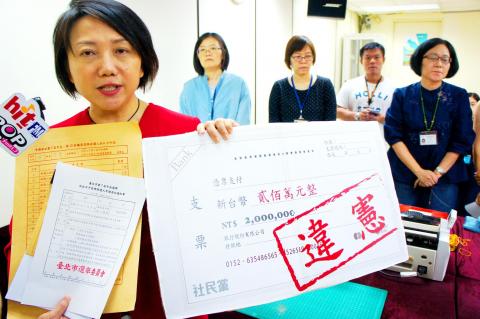Social Democratic Party (SDP) Convener Fan Yun (范雲) yesterday said she would file for a constitutional interpretation after the Taipei City Election Commission rejected her application to run for Taipei mayor on the grounds that she refused to pay an election deposit of NT$2 million (US$65,123).
“The rule about election deposits clearly contravenes Article 7 and Article 129 of the Constitution, which guarantees people’s equal right to stand for election,” she told a news conference outside the Taipei City Election Commission.
The news conference came a week after she announced on Facebook that she would withdraw from the race, citing difficulty meeting the deposit requirement.

Photo: Huang Chien-hao, Taipei Times
A deposit of NT$200,000 is required to run for mayor or county commissioner, but it is NT$2 million if the city is a special municipality.
“The rule has made the right to stand for election a privilege of the rich, preventing the young, the poor and minor parties from participating in politics,” she said.
Refusing to pay the deposit and filing for a constitutional interpretation over its legality will be a first step to reforming the nation’s money-driven political system, she said, adding that she hoped more people would join the conversation about more reasonable election requirements.
“In Taiwan, mayoral candidates are not required to have an IQ score of at least 157, a doctorate, or work experience as a city councilor or legislator. We do not ask what their platforms are — we only ask whether they have NT$2 million,” said Chen Yu-hsin (陳又新), a lawyer and SDP Taipei city councilor candidate for Neihu (內湖) and Nangang (南港) districts.
“Does having NT$2 million guarantee that a person can be a good mayor? If it is undemocratic to ban someone from standing for election based on their intelligence, diploma or experience, why is it acceptable to do so based on how wealthy they are?” Chen asked.
Minor parties and independent politicians are important to maintain the quality of democracy, as they prevent major parties from dominating the government, said Su Yen-tu (蘇彥圖), an Academia Sinica associate research fellow, urging people to back reform of the political system regardless of whether they support the SDP.
Recent examples of countries reforming their deposit requirements include Canada, he said, adding that a Canadian court in October last year ruled that a deposit requirement for prospective candidates in federal elections contravened the nation’s constitution.
Tamkang University professor Kurt Tu (涂予尹) said Taiwan should learn from the experience of other systems that offer alternatives to paying a deposit.
In California, prospective candidates for state governor have the option of submitting a minimum of 7,000 valid signatures instead of a deposit, he said.
“The only reason that the Central Election Commission set the deposit requirement at NT$2 million this year is because that has always been the rule,” he added.

The first global hotel Keys Selection by the Michelin Guide includes four hotels in Taiwan, Michelin announced yesterday. All four received the “Michelin One Key,” indicating guests are to experience a “very special stay” at any of the locations as the establishments are “a true gem with personality. Service always goes the extra mile, and the hotel provides much more than others in its price range.” Of the four hotels, three are located in Taipei and one in Taichung. In Taipei, the One Key accolades were awarded to the Capella Taipei, Kimpton Da An Taipei and Mandarin Oriental Taipei. Capella Taipei was described by

EVA Airways today confirmed the death of a flight attendant on Saturday upon their return to Taiwan and said an internal investigation has been launched, as criticism mounted over a social media post accusing the airline of failing to offer sufficient employee protections. According to the post, the flight attendant complained of feeling sick on board a flight, but was unable to take sick leave or access medical care. The crew member allegedly did not receive assistance from the chief purser, who failed to heed their requests for medical attention or call an ambulance once the flight landed, the post said. As sick

Minister of Economic Affairs Kung Ming-hsin (龔明鑫) yesterday said that private-sector refiners are willing to stop buying Russian naphtha should the EU ask them to, after a group of non-governmental organizations, including the Centre for Research on Energy and Clean Air (CREA), criticized the nation’s continued business with the country. While Taiwan joined the US and its Western allies in putting broad sanctions on Russia after it invaded Ukraine in 2022, it did not explicitly ban imports of naphtha, a major hard-currency earner for Russia. While state-owned firms stopped importing Russian oil in 2023, there is no restriction on private companies to

INDUSTRY: Beijing’s latest export measures go beyond targeting the US and would likely affect any country that uses Chinese rare earths or related tech, an academic said Taiwanese industries could face significant disruption from China’s newly tightened export controls on rare earth elements, as much of Taiwan’s supply indirectly depends on Chinese materials processed in Japan, a local expert said yesterday. Kristy Hsu (徐遵慈), director of the Taiwan ASEAN Studies Center at the Chung-Hua Institution for Economic Research, said that China’s latest export measures go far beyond targeting the US and would likely affect any country that uses Chinese rare earths or related technologies. With Japan and Southeast Asian countries among those expected to be hit, Taiwan could feel the impact through its reliance on Japanese-made semi-finished products and